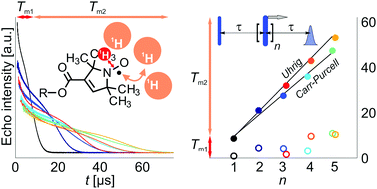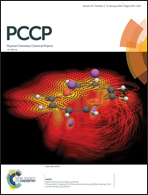Dynamical decoupling of nitroxides in o-terphenyl: a study of temperature, deuteration and concentration effects†
Abstract
We have characterized the temperature dependent transverse relaxation for 100 μM protonated and deuterated nitroxides in both protonated and deuterated o-terphenyl (OTP and dOTP) in distinct temperature regimes between 10 K and room temperature (RT). The choice of sample compositions allowed for a clear separation into slow and fast relaxation contributions based on a sum of two stretched exponential (SSE) parameterization between 10 and 60 K, and likewise at RT. The slow contribution is purely matrix dependent, while the fast process is determined by an interplay between a molecule and a matrix. Our systematic study of dynamical decoupling (DD) as a function of temperature (at 40, 80 K and RT), spin concentration, deuteration of nitroxide and/or OTP matrix and DD scheme for 1 to 5 refocusing pulses reveals that DD significantly prolongs phase memory times with respect to Hahn echo relaxation at 40 K, which we discuss in an SSE framework. At 80 K and RT, where (intra)molecular motions dominate relaxation, DD does not preserve electron spin coherence independent of the sample composition. Instead, we report a matrix nuclei dependent performance of the applied DD scheme at 40 K with Uhrig outperforming Carr–Purcell DD in OTP, and vice versa for a dOTP matrix.



 Please wait while we load your content...
Please wait while we load your content...